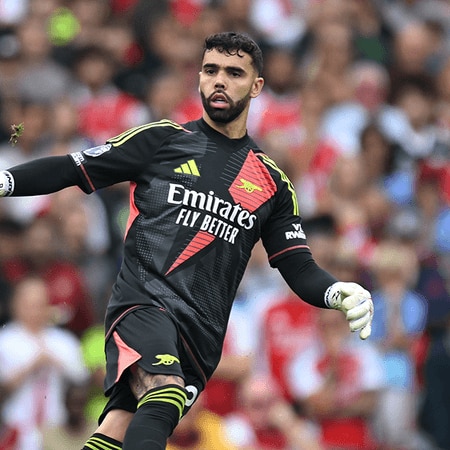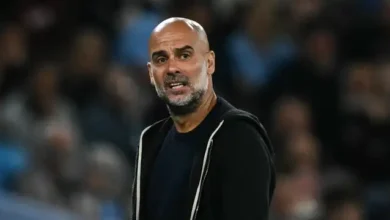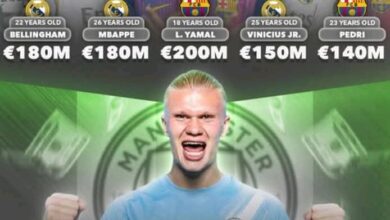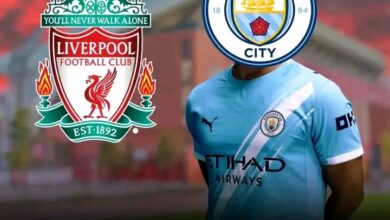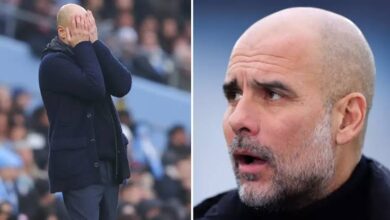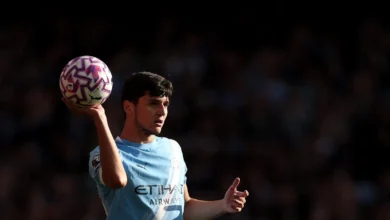Pep nominated for April Premier League manager of the month award

Manchester City Football Club, commonly referred to as Man City or simply City, stands as one of the modern footballing powerhouses in England and across the global stage. From humble beginnings to unprecedented domestic dominance, the story of Manchester City is one of remarkable transformation, particularly in the 21st century. Based in Manchester, England, the club competes in the Premier League, the top flight of English football, and has established itself as a formidable force under the ownership of the Abu Dhabi United Group and the tactical genius of Pep Guardiola.
This comprehensive profile explores Manchester City’s rich history, its revolutionary modern era, key personalities who have shaped the club, tactical innovations, infrastructure developments, and the broader cultural and social impacts of the club. From Maine Road to the Etihad Stadium, from relegation battles to domestic trebles, Manchester City’s journey represents one of football’s most fascinating evolutions.
Manchester City’s story begins in 1880, when the club was founded as St. Mark’s (West Gorton), before being renamed Manchester City Football Club in 1894. The club’s early decades were characterized by ups and downs, with their first major trophy coming in 1904 when they won the FA Cup. The early 20th century saw City establish themselves as a competitive force in English football, with periods of success interspersed with challenges.
The 1930s marked a significant era in City’s history, with the club winning the FA Cup in 1934 and their first League Championship in 1937. This period also saw the emergence of club legends such as Frank Swift and Eric Brook, who helped establish City’s reputation for attacking, entertaining football.
The post-war years brought mixed fortunes, with the 1950s delivering another FA Cup triumph in 1956 under the management of Les McDowall. This team, featuring players like Bert Trautmann—a former German prisoner of war who famously played on with a broken neck in the FA Cup final—embodied the resilient spirit that would become characteristic of the club.
The 1960s and 1970s represented a golden era for Manchester City. Under the management of Joe Mercer and with Malcolm Allison as assistant, City won the League Championship in 1968, the FA Cup in 1969, and both the European Cup Winners’ Cup and League Cup in 1970. This team, featuring talents like Colin Bell, Francis Lee, and Mike Summerbee, played with a flair and attacking verve that captured the imagination of fans.
However, the following decades saw City enter a period of decline. The 1980s and early 1990s were particularly challenging, with the club suffering relegations and financial difficulties. In 1998, City hit their lowest point when they were relegated to the third tier of English football—an almost unimaginable fall for a club of their stature.
The road back began immediately, with consecutive promotions under Joe Royle securing their return to the Premier League in 2000. Though the club would experience another relegation and promotion cycle, these tumultuous years helped forge a unique fan culture characterized by unwavering loyalty and self-deprecating humor.
The watershed moment in Manchester City’s modern history came in September 2008 when the Abu Dhabi United Group, led by Sheikh Mansour bin Zayed Al Nahyan, acquired the club. This takeover would completely transform City’s fortunes and position in world football.
Significant investment in playing staff saw immediate results, with the club finishing in European qualification spots and gradually assembling a squad capable of challenging for major honors. The breakthrough came in 2011, when City won the FA Cup—their first major trophy in 35 years—followed by a dramatic Premier League title win in 2012, secured with Sergio Agüero’s unforgettable last-minute goal against Queens Park Rangers.
The arrival of Pep Guardiola as manager in 2016 elevated City to unprecedented heights. Under his guidance, the club has redefined English football with their possession-based style, tactical innovations, and relentless pursuit of excellence. This period has delivered multiple Premier League titles, domestic cups, and established City as the dominant force in English football.
The appointment of Pep Guardiola in 2016 marked the beginning of what many consider the most successful chapter in Manchester City’s history. After a transitional first season, Guardiola’s influence began to take full effect, with the 2017-18 campaign seeing City break numerous Premier League records:
– 100 points accumulated (a record known as “The Centurions”)
– 32 wins (a record at the time)
– 106 goals scored
– 19-point gap to second place
What makes Guardiola’s City so remarkable is not just the trophies won, but the manner in which they’ve been secured. His City teams have combined tactical sophistication with technical excellence, redefining the standards of performance in English football. The implementation of positional play, with its focus on creating numerical advantages through intelligent positioning and movement, has revolutionized the Premier League.
The 2018-19 season saw City achieve the unprecedented domestic treble of Premier League, FA Cup, and League Cup—a feat never before accomplished in English men’s football. The title race against Liverpool was particularly notable, with City winning their final 14 league games to edge out their rivals by a single point.
Under Guardiola, Manchester City has developed a distinctive playing identity characterized by:
Manchester City’s academy has undergone a fundamental transformation, evolving from a system that had struggled to produce first-team players to one of the most productive youth development operations in European football.
Recent academy graduates like Phil Foden—a local talent who has developed into one of England’s most gifted players—exemplify the academy’s success. The focus on technical development, tactical understanding, and character formation has created a production line of talented players who either strengthen the first team or generate significant transfer revenue.
The club’s approach integrates education and welfare alongside football development, recognizing that only a small percentage of academy players will reach the first team, and therefore prioritizing broader personal development alongside sporting excellence
Manchester City Women’s Football Club, established in its current form in 2012, has played a pivotal role in the development of women’s football in England. The team has won the Women’s Super League, FA Women’s Cup, and Continental Cup (League Cup), establishing itself as one of the leading forces in the English women’s game.
By providing equal access to facilities, medical support, and professional infrastructure, City has demonstrated a genuine commitment to women’s football rather than treating it as a peripheral concern. The integration of the women’s team within the broader club identity has helped grow audience and interest in the women’s game c
Manchester City’s commercial operation has expanded dramatically over the past decade, with the club now generating substantial revenue from multiple streams beyond matchday incomem
This commercial growth has been essential in Manchester City’s journey toward financial sustainability, reducing reliance on ownership investment and moving toward compliance with financial regulations.
The club’s rapid financial growth has not been without controversy, with UEFA’s Financial Fair Play regulations presenting challenges to City’s business model. A 2020 case saw the club initially banned from European competition for alleged breaches of these regulations, though this decision was subsequently overturned by the Court of Arbitration for Sport.
City has faced additional charges from the Premier League regarding financial regulations, with these cases representing an ongoing challenge to the club’s operations and reputation. The club has consistently maintained its innocence regarding these allegations and has fought them vigorously through legal channels
Perhaps the most innovative aspect of Manchester City’s business model has been the development of the City Football Group (CFG)—a network of clubs across global markets including the United States (New York City FC), Australia (Melbourne City FC), Japan (Yokohama F. Marinos), India (Mumbai City FC), and several others.
This multi-club ownership model provides numerous advantages:
– Streamlined player recruitment and development pathways
– Knowledge sharing across different football cultures
– Market presence in key global regions
– Diversified commercial opportunities
The CFG approach represents a pioneering model in football ownership that many competitors have sought to emulate.
Manchester City’s fan base has maintained a distinctive identity despite the club’s transformation. Characterized by loyalty through difficult periods and a certain self-deprecating humor, City supporters often reference the club’s “Typical City” tradition—an expectation that moments of promise will inevitably be followed by disappointment.
This supporter culture has faced challenges during the club’s rise to dominance, with tensions between traditional matchgoing fans and a growing global audience that has discovered the club during its successful modern era. The club has worked to maintain authentic connections to its local community while embracing its expanding international appeal
Manchester City’s community work through “City in the Community” (CITC) represents one of the club’s most important contributions. Operating since 1986, CITC delivers programs focused on:
– Health and activity promotion
– Education and employability
– Inclusion and youth engagement
– Football participation
These initiatives reach over 30,000 people annually in Greater Manchester, demonstrating the club’s commitment to leveraging its profile and resources for social benefit.
The club’s response during the COVID-19 pandemic, including making facilities available to the National Health Service and supporting local food banks, further demonstrated this community-focused ethos.
Despite domestic dominance, Champions League success proved elusive for Manchester City until recently. The pressure to deliver consistent European success while maintaining domestic excellence represents an ongoing sporting challenge, with the financial and emotional investment in Champions League campaigns reflecting the importance of this competition to the club’s global standing.
The eventual achievement of Champions League glory marked a significant milestone, but the challenge now becomes sustaining success across all competitions—a feat that has proven difficult even for football’s most resourced clubs.
Perhaps the most significant medium-term challenge facing Manchester City is succession planning for the post-Guardiola era. The manager’s influence has been so profound that his eventual departure will necessitate careful planning to maintain continuity in playing philosophy and performance standards.
Similar succession questions apply to key playing personnel, with the replacement of club legends requiring both technical scouting excellence and understanding of the cultural aspects that have underpinned City’s success.
The evolving football regulatory landscape presents ongoing challenges for Manchester City’s business model. From UEFA’s Financial Fair Play to the Premier League’s Profitability and Sustainability Rules, external constraints on spending and investment continue to evolve, requiring adaptive strategies from the club’s leadership.
The club’s legal battles over financial regulations have created uncertainty that affects both reputation and planning. City’s approach to these challenges will significantly shape its medium-term trajectory.
Manchester City’s transformation from a club that experienced relegation to the third tier of English football to one of the world’s most successful sporting organizations represents one of football’s most remarkable journeys. The combination of strategic ownership investment, infrastructure development, world-class leadership, and playing talent has created a sporting institution that has redefined expectations in English football.
Yet perhaps most impressive has been City’s ability to balance excellence across multiple dimensions simultaneously: sporting success, youth development, commercial growth, infrastructure investment, and community engagement. This holistic approach to club development has created a model that many rivals seek to emulate.
As Manchester City continues to write new chapters in its history, the club faces the challenge of maintaining the hunger and innovation that have characterized its rise while handling the unique pressures that come with being at the summit of world football. For supporters who experienced the club’s darker days, the current era represents a golden age that few could have imagined—a testament to football’s capacity for transformation and the power of long-term strategic vision

